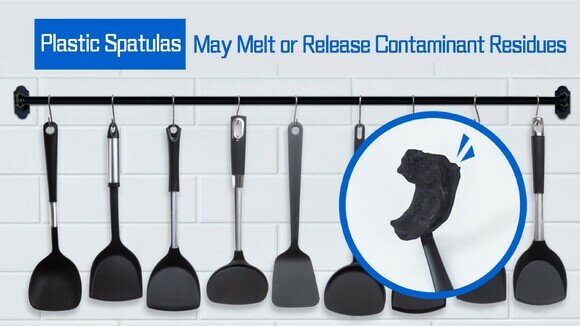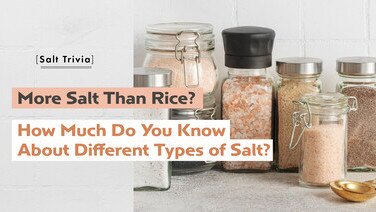For those who normally use plastic spatulas (turners) for cooking, if these are not used properly, the plastic spatulas may melt or deform, or even release contaminant residues or harmful / toxic substances! There are 3 main aspects about plastic spatulas that consumers should beware of:
The residues / substances released may affect the liver and kidney or even cause cancer
When in contact with heat during cooking, stir-frying or mixing, or with prolonged exposure to sour, alcohol-infused and greasy food, plastic spatulas may release the following residues or chemical substances which may migrate to the food being cooked and cause potential health issues after consumption.
- Incompletely-polymerized nylon monomer: If the spatula is made of nylon, substances such as caprolactam or hexamethylene diamine may be released. When ingested in large quantity, they may cause irritation to the skin, eyes and respiratory system, and cause harm to the respiratory system, liver or kidney.
- Chemical substances: such as primary aromatic amines (PAA) (some of which may cause cancer), other additives (e.g. stabilizers, colorants, etc.), or degradation products, etc.
Therefore, it is very important to choose a plastic spatula that complied with international standards in terms of residue migration (i.e. not exceeding the recommended level).
Immersion in hot oil may accelerate aging
Although many spatulas have warnings (both in Chinese and English) reminding consumers not to keep the products in the hot pots. However, we often remove the notice before using the utensil, and then totally forget about the reminder. We may leave the plastic spatula in the cookware or immerse it in oil while cooking and as a result, melting, deformation or blisters may occur, and harmful substances may also be released. Therefore, consumers should be cautious not to soak the plastic spatula head in hot oil for too long to avoid damage or rapid aging.
Alternatives to plastic spatula
If deep frying or prolonged heating or stirring of food is required, it is suggested that wooden or bamboo-made kitchenware are to be used. Some wooden or bamboo-made spatulas also have smooth edges which won’t scratch the non-stick coating on frying pans. As wooden or bamboo-made spatulas are made from natural material, they are more environmentally friendly than plastic products!
Tips on using wooden or bamboo-made spatulas
Before switching to wooden or bamboo-made spatulas, you should take note of these characteristics:
- Flexibility: Wooden or bamboo-made spatulas generally have thicker heads than plastic ones, and the handles are also straighter and firmer. As such they may not score well in “flexibility” .
- Discoloration: The spatula head may turn dark after prolonged contact with hot oil, colored food items or sauces.
- Expansion / contraction with heat change: The spatula head may crack and food particles may get trapped within the tiny crevices making the utensil difficult to clean.
- Beware of mold: Wooden or bamboo-made spatulas are more difficult to dry when wet and are more prone to molds during humid days. As such consumers should dry the utensils thoroughly after use and keep them in dry places.
The Consumer Council conducted a test earlier on 17 models of Chinese-style plastic spatulas in the market. If you want to know which one has the highest score and is safer to use, click here to read the article “Over Half of Plastic Turners Had Excessive Overall Residue Migration in Acidic Environment. 1 Model Deformed in Heat-Resistance Test”, CHOICE Magazine, Issue 523 (Chinese version only).








![[Handwashing Cold Knowledge] Debunking 4 common handwashing myths](/f/guide_detail/409326/376c212/43_4%E5%80%8B%E6%B4%97%E6%89%8B%E5%B8%B8%E8%A6%8B%E8%BF%B7%E6%80%9D_Eng.jpg)


